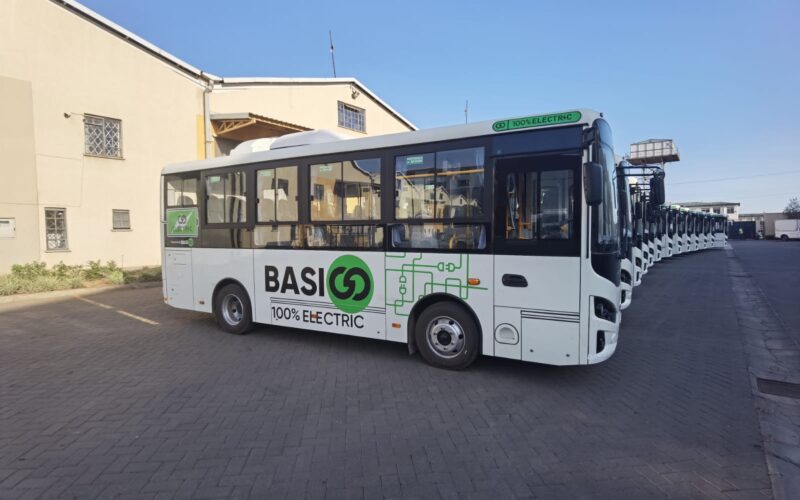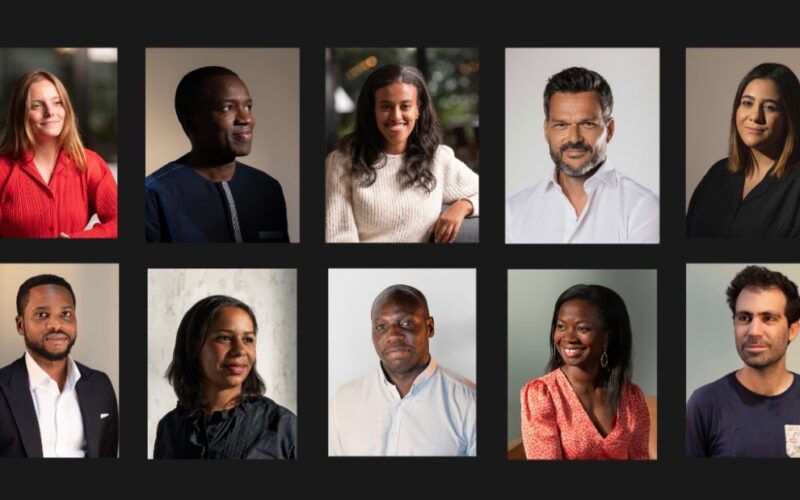The race to electrify Africa’s transport sector is heating up, and development finance institutions (DFIs) are firmly in the driver’s seat. The latest move comes from France’s Proparco, which has announced an investment in Nairobi-based electric bus startup BasiGo, backing its expansion in Kenya and Rwanda.
The deal, confirmed this week, sees the private sector arm of the French Development Agency (AFD) join a growing list of European and multilateral funders betting on African e-mobility. While the exact size of Proparco’s investment was not disclosed, its strategic intent is clear: to accelerate the shift away from diesel-powered public transport in some of the world’s fastest-growing urban areas.
For BasiGo, the investment arrives at a critical inflection point. The company has already deployed 100 electric buses across Kenya and Rwanda and recently doubled its monthly assembly capacity to 20 buses after raising $42 million (KES 5.4 billion) in Series A funding last year. Now, with Proparco’s backing and an ambitious target of 1,000 buses by 2027, the startup is positioning itself as East Africa’s dominant electric bus player.
Why DFIs Are All-In on African E-Mobility
Proparco’s investment in BasiGo isn’t an isolated bet. It’s part of a broader DFI strategy that recognizes Africa’s unique position in the global energy transition.
Unlike developed markets where e-mobility means reducing emissions from existing fleets, Africa represents an opportunity for emissions avoidance—building clean transport infrastructure before locking in decades of fossil fuel dependency. Road transport accounts for over 40% of Kenya’s total energy consumption and is the fastest-growing source of emissions, according to the Energy and Petroleum Regulatory Authority (EPRA). The country spends over $5 billion annually on fuel imports—equivalent to about 15% of GDP—making the sector highly vulnerable to global oil price volatility.
“By supporting BasiGo, we are helping to unlock a new generation of clean, reliable mass public transport solutions for tens of thousands of passengers in Kenya and Rwanda and to scale this solution in other African cities,” said Jean Guyonnet-Dupérat, Proparco’s regional director for East Africa.
The numbers support the urgency. Electric buses reduce CO₂ emissions by an estimated 70-90% compared to diesel buses while simultaneously addressing air pollution—a major public health crisis in cities like Nairobi and Kampala. Since BasiGo’s inception in 2021, its buses have transported over 4 million passengers and avoided 1,175 tonnes of greenhouse gas emissions.
Proparco’s involvement now connects BasiGo to the AFD Group’s wider €1 billion ($1.15 billion) annual commitment to low-carbon urban mobility worldwide. This positions the French DFI as a significant actor in Africa’s transport transformation, following previous investments in electric bus projects in Senegal (Dakar Mobilité) and e-mobility platforms like Nigeria’s MAX.
The BasiGo Model: Pay-As-You-Drive Meets Local Assembly
What makes BasiGo interesting isn’t just that it’s importing Chinese-made BYD buses and King Long vehicles. It’s that the company has cracked two problems that have stymied African e-mobility adoption: affordability and infrastructure.
The affordability challenge is addressed through BasiGo’s Pay-As-You-Drive model. Rather than requiring bus operators—typically organized as savings and credit cooperatives (SACCOs)—to purchase vehicles outright (BasiGo’s E9 Kubwa model costs approximately $58,000), operators lease buses and pay for usage. The package includes charging, maintenance, insurance, and a 90% uptime guarantee. This shifts capital expenditure to operational expenditure, making electric buses financially accessible to operators who couldn’t otherwise afford them.
The infrastructure challenge is being tackled head-on. BasiGo is building what will become East Africa’s largest charging and service depot in Rwanda—the Rwandex facility—with 1 MW power capacity able to charge more than 25 buses nightly. Additional charging stations are being deployed nationwide to support inter-city routes. In Kenya, the company operates charging infrastructure at its Thika assembly plant, 50 km northeast of Nairobi.
Local assembly is strategic. Working with Kenya Vehicle Manufacturers, BasiGo launched Kenya’s first dedicated electric bus assembly line in 2024. While key components—particularly the 210 kWh CATL LFP battery cells—still come from China, local assembly reduces costs, creates jobs (the company aims for 300 production jobs), and positions BasiGo to benefit from government incentives favoring locally assembled vehicles.
BasiGo CEO Jit Bhattacharya, a co-founder alongside CFO Jonathan Green, previously told TechCabal: “We shall be assembling 20 buses every month and the orders are many. We intend to work round the clock to increase the number, because the demand may rise with time.”
That demand is already materializing. The company reports over 360 reservations from Rwandan bus operators alone, many seeking to replace aging diesel fleets or expand services with electric alternatives.
The DFI Stack: Who Else Is Betting on BasiGo?
Proparco joins an increasingly crowded cap table of development finance institutions and impact investors backing BasiGo. The company’s $42 million Series A round last year was led by Africa50, the pan-African infrastructure investor, with $24 million in equity. The round also included:
- $17.5 million in debt from British International Investment (BII), the UK’s development finance institution
- $10 million debt facility from the U.S. Development Finance Corporation (DFC)
- Follow-on equity from Novastar Ventures, CFAO Kenya, Mobility54, SBI Investment, Trucks VC, Moxxie Ventures, and the Susquehanna Foundation
This DFI consortium reflects a broader trend: patient capital from development institutions willing to accept longer time horizons and lower returns than purely commercial investors. DFIs bring not just capital but also credibility, risk-sharing instruments, and connections to government policymakers—critical advantages in markets where regulatory frameworks remain uncertain.
BasiGo raised a total of $63.1 million since its 2021 founding, making it one of the best-funded e-mobility startups in Sub-Saharan Africa. For context, Kenya’s Roam—which manufactures electric motorcycles and buses—raised $24 million in early 2024, while Nigeria’s MAX secured over $40 million in institutional debt for driver financing alongside venture equity.
The Policy Question: Will Governments Help or Hinder?
Here’s the uncomfortable reality: African e-mobility’s success depends heavily on government policy, and the signals are mixed.
Rwanda has emerged as the continent’s most EV-friendly environment, offering free land for charging stations, discounted electricity for EVs, zero import duties on electric vehicles and parts, and tax breaks that have attracted Chinese manufacturer BYD to establish a presence. It’s no accident that BasiGo is aggressively expanding in Rwanda, with plans to deploy 100 electric buses there in 2025 alone.
Kenya presents a more complicated picture. President William Ruto recently announced plans to waive taxes on the first 100,000 two- and four-wheeler electric vehicles locally assembled in the country—a potentially transformative policy. The U.S. government backed this with direct $10 million loans to BasiGo, Roam, and Mogo.
But Kenya’s 2024 Finance Bill proposed value-added tax (VAT) on electric bikes, buses, solar panels, and lithium-ion batteries—moves that would significantly increase costs for e-mobility companies. The Ministry of Roads and Transport unveiled Kenya’s first Electric Mobility Draft Policy in March 2024, described as “a pivotal moment,” but implementation remains unclear. The Traffic Act must still be updated to accommodate emerging technologies.
Kenya’s target of having at least 5% of newly registered vehicles be electric by 2025 (as outlined in the National Energy Efficiency and Conservation Strategy) appears unlikely to be met. As of 2025, Kenya has an estimated 9,000 registered EVs—a fraction of the country’s vehicle fleet.
Uganda, Tunisia, and even Senegal (with its AFD-backed electric BRT system in Dakar) have implemented more coherent policy frameworks supporting e-mobility. South Africa, the continent’s largest EV market with over 10,000 electric vehicles, benefits from utilities backing charging corridors.
The policy inconsistency creates risk for companies like BasiGo that require predictable regulatory environments and fiscal incentives to scale. One industry insider told TechCabal: “The biggest risk isn’t technology or demand—it’s waking up to find the government has changed the rules.”
The Unit Economics Question
Electric buses are capital-intensive. Even with Pay-As-You-Drive models that defer upfront costs, someone—in this case, BasiGo—must finance vehicle acquisition, charging infrastructure, and maintenance operations before revenue flows stabilize.
This is where DFI debt facilities become essential. The $17.5 million from BII and $10 million from DFC provide low-cost, long-tenor financing that allows BasiGo to scale without crushing interest payments. Proparco’s investment likely includes similar favorable terms—development finance institutions typically accept lower returns than commercial lenders in exchange for development impact.
But questions remain about long-term unit economics. Can BasiGo’s Pay-As-You-Drive fees generate sufficient margin to cover capital costs, operations, and provide returns to equity investors? Electric buses require less maintenance than diesel (no engine oil changes, fewer moving parts), and electricity in Kenya and Rwanda—where over 90% comes from renewables—is relatively cheap. But battery replacement costs, which BII and Proparco have earmarked specific funding for, remain significant.
BasiGo’s bet is that scale will drive unit economics down. At 1,000 buses, the company would have negotiating power with suppliers, operational efficiencies in maintenance and charging, and brand recognition that attracts operators. The company is also expanding its model to other vehicle types, potentially diversifying revenue streams.
What This Means for Africa’s E-Mobility Ecosystem
Proparco’s investment in BasiGo signals that African e-mobility is moving from pilot phase to scale phase. The question is no longer “Can electric buses work in Africa?” but “How fast can we deploy them?”
The DFI involvement is both encouraging and concerning. Encouraging because patient capital is flowing. Concerning because dependence on DFIs rather than commercial capital suggests the sector hasn’t yet proven commercial viability at scale. If BasiGo and peers can’t eventually attract pension funds, insurance companies, and commercial banks—not just development institutions—the sector’s growth will remain constrained.
For African cities facing catastrophic air pollution and mounting fuel import bills, electric buses represent both environmental and economic imperatives. Nairobi’s informal matatu system alone transports millions daily—a massive addressable market if operators can be convinced to switch.
For Chinese manufacturers like BYD and King Long, Africa represents a growth market as European and American markets become saturated or introduce tariffs on Chinese EVs. Partnerships with local assemblers like BasiGo allow Chinese firms to establish African footholds without directly operating there.
For DFIs like Proparco, BII, DFC, and Africa50, African e-mobility offers measurable climate impact, job creation, and technology transfer—ticking multiple boxes on development mandates. The willingness to deploy hundreds of millions in this sector reflects confidence that the transition is inevitable, even if timelines remain uncertain.
The Road to 1,000 Buses
BasiGo’s 2027 target of 1,000 electric buses operating across Kenya and Rwanda is audacious. At current production capacity of 20 buses per month, reaching 1,000 would require sustained output for over four years. The company would need to ramp up to 30-40 buses per month to hit the target by 2027.
That assumes no supply chain disruptions, consistent policy support, continued access to capital, and operator demand remaining strong. It also assumes BasiGo can maintain the 90% uptime guarantee it promises—a challenging commitment in markets where spare parts logistics and technical expertise remain scarce.
But if BasiGo succeeds, the implications extend beyond Kenya and Rwanda. The company’s model—local assembly, Pay-As-You-Drive financing, DFI-backed expansion—becomes replicable across Sub-Saharan Africa. Ghana, Ethiopia, Tanzania, Uganda, and Côte d’Ivoire all have cities with transport systems ready for electrification and governments expressing interest in e-mobility.
Jean Guyonnet-Dupérat’s comment about “scaling this solution in other African cities” suggests Proparco sees BasiGo as a template, not an isolated case. If the model works, expect similar DFI investments in e-mobility across the continent.
For now, BasiGo has the capital, the infrastructure, the government relationships (however imperfect), and the operator demand. Whether it can execute on its 1,000-bus vision will determine not just the company’s future but whether African e-mobility moves from aspiration to mass adoption.
The race is on. And judging by the DFI money pouring in, the smart money believes Africa’s electric bus future is inevitable—even if the timeline remains uncertain.













Comments 1